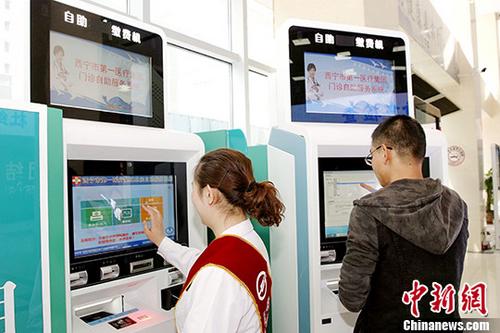China News Service, Beijing, March 11 (Reporter Wang Enbo Zhang Ni) In answering a question from a reporter from China News Agency today, Premier Li Keqiang said that the scope of direct reimbursement across provinces will be expanded this year, and each county must determine a fixed point before the end of next year. Medical institutions can directly reimburse medical expenses, including outpatient fees, and should not worry the elderly.
The Fourth Session of the 13th National People's Congress closed on the afternoon of the 11th. Li Keqiang later met with Chinese and foreign journalists and answered questions.
On March 11, Chinese Premier Li Keqiang attended a press conference at the Great Hall of the People in Beijing and answered questions from Chinese and foreign journalists.
In order to effectively prevent and control the epidemic and jointly maintain public health and health, the press conference will be conducted in the form of online video.
Photo by China News Agency reporter Du Yang
In recent years, China has continued to deepen reforms, and the problem of reimbursement of hospitalization expenses in different places has been well solved, which has greatly facilitated medical treatment in different places.
But now many people go out to work, and many elderly care for the elderly in different places. In some places, they have to go back to their hometowns to reimburse them for outpatient treatment and medicine. The period of advancement and running errands is very inconvenient.
The reporter asked when the reimbursement of outpatient expenses can be resolved.
Li Keqiang said that many elderly people care for the elderly in remote places, and some are helping their children with their children.
These old people often worry about reimbursing medical expenses in different places. This problem should be resolved gradually.
This year we will expand the scope of cross-provincial direct reimbursement. Before the end of next year, each county must determine a designated medical institution that can directly reimburse medical expenses, including outpatient fees, so that the elderly cannot worry about this.
There are also some things that don't seem to be big, and if government workers take more care, they can make the elderly and their families a little more comfortable.
Data map: People in the hospital use network terminals to inquire about medical treatment information.
Photo by China News Agency reporter Zhang Tianfu
A little more news:
Solving the problem of reimbursement for medical treatment in different places, the country continues to deepen reforms
Medical insurance cannot be reimbursed in other places, which is a major pain point for ordinary people to see a doctor. Patients often suffer from problems such as paying high medical expenses and reimbursing for "breaking legs".
In order to break through the "blocking points" of patients' remote medical insurance reimbursement, in recent years, relevant departments have continuously deepened reforms and made careful arrangements to gradually solve this problem related to people's livelihood:
At the end of 2016, China initiated the direct settlement of hospitalization expenses for medical treatment in different places across provinces, and real-time settlement of hospitalization expenses for insured persons who were hospitalized in different places across provinces after filing.
In March of the following year, the national inter-provincial medical settlement platform went online.
Hospitalization expenses can be reimbursed in different places, which solves the worries of many people, especially those who are seriously ill.
But in fact, with the rapid population flow in China, many young people work in different places, many elderly care for the elderly, colds and fevers can go to the outpatient clinic to take medicine, some common diseases such as high blood pressure require long-term medication, and the outpatient medical expenses cannot be reimbursed in different places. People are troubled.
Starting from January 1 this year, Chongqing, Sichuan, Guizhou, Yunnan, and Tibet will start a pilot program for direct settlement of chronic and special diseases in outpatient clinics with the two types of chronic diseases in outpatient clinics, namely hypertension and diabetes. jobs.
Since then, 15 provinces and autonomous regions including Shanxi, Inner Mongolia, Liaoning, Jilin, Heilongjiang, Fujian, Jiangxi, Shandong, Hubei, Guangxi, Hainan, Shaanxi, Ningxia, Qinghai, and Xinjiang have been added as pilot provinces for direct settlement of ordinary outpatient expenses.
It is understood that starting from last month, a total of 27 provinces (autonomous regions, municipalities) across the country can rely on the national off-site medical settlement system to unify the trial operation of direct settlement of ordinary outpatient expenses across provinces.
I believe that with the continuous deepening of this reform, the settlement of outpatient expenses in different places will be fully implemented, and the people will no longer have to "break their legs" for reimbursement for medical treatment.

